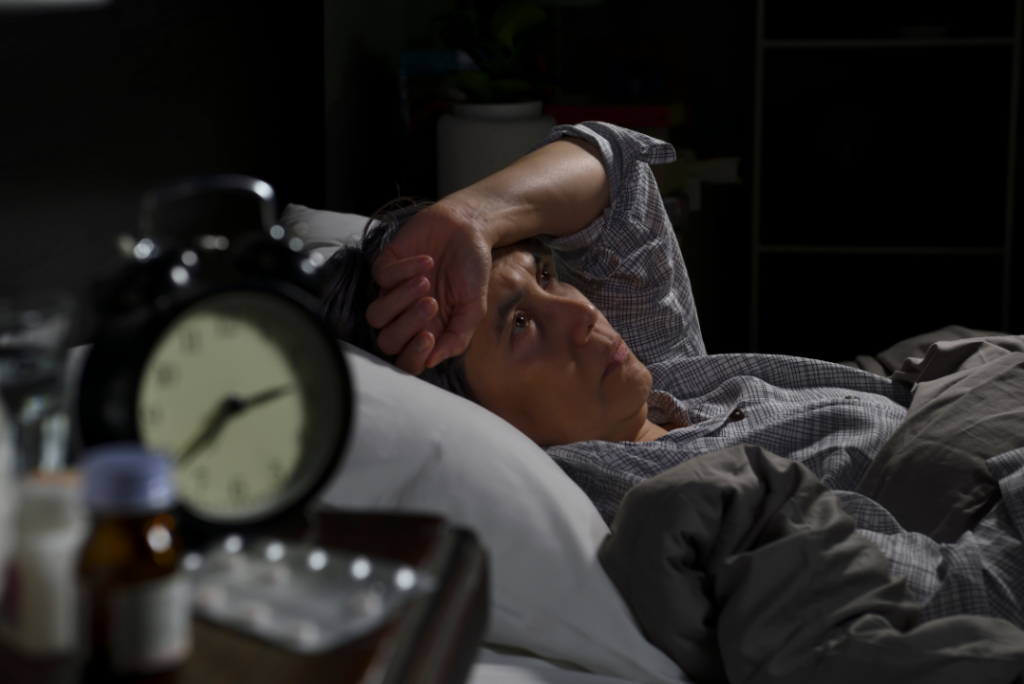
Contact Us

Insomnia can be a challenging and persistent condition, but it is much more than a lack of sleep—it’s a brain disorder affecting the dynamic connections within the brain.
At Neurotherapeutix, we specialize in treating insomnia using advanced repetitive transcranial magnetic stimulation (rTMS) guided by functional MRI (fMRI) technology. This non-invasive therapy targets the specific brain regions responsible for disrupted sleep patterns, offering a new, innovative solution for patients suffering from chronic insomnia.
To learn more, contact us directly or continue reading below.

Insomnia is a common sleep disorder that affects millions of people worldwide. It can manifest as difficulty falling asleep, staying asleep, or waking up too early and being unable to go back to sleep.
Chronic insomnia can have a significant impact on daily functioning, including cognitive impairment, mood disturbances, and increased risk for other health conditions such as depression, anxiety, and cardiovascular diseases.
There are two main types of insomnia:
According to the American Academy of Sleep Medicine (AASM), chronic insomnia is defined as having symptoms at least three times per week for three months or longer. Insomnia is often related to stress, lifestyle factors, or co-existing medical or psychiatric conditions, making it essential to treat the underlying causes as well as the symptoms.
TMS therapy for insomnia and sleep disorders is a non-invasive treatment that uses magnetic fields to stimulate nerve cells in the brain. This method has been shown to treat conditions such as depression and anxiety effectively, but recent studies have also explored its impact on insomnia. TMS can directly influence brain networks associated with sleep, offering relief to patients who have not responded to traditional sleep medications or therapies.
In one study, researchers found that repetitive transcranial magnetic stimulation (rTMS) significantly improved sleep quality and duration in patients with chronic primary insomnia. The study also reported improvements in Stage III and REM sleep, which are crucial for restorative rest.
At Neurotherapeutix, we use fMRI technology to guide the TMS process, ensuring that the treatment is targeted to the areas of the brain most affected by insomnia. By incorporating advanced Resting-state fMRI, we can precisely map brain activity and connectivity, enhancing the accuracy and effectiveness of the therapy. This personalized approach increases the likelihood of success and reduces the chances of side effects compared to standard TMS therapy.
The relationship between sleep and mental health is complex and bi-directional. Poor sleep can exacerbate mental health conditions such as depression, anxiety, and PTSD, while untreated mental health disorders can worsen sleep problems.
Moreover, chronic sleep deprivation affects brain function, reducing emotional regulation, memory, and cognitive processing. In patients with insomnia, TMS therapy has been shown to not only improve sleep but also alleviate symptoms of mental health disorders. By restoring healthy sleep patterns, patients can experience a significant improvement in their overall well-being and quality of life.
Primary insomnia (PI) is often associated with abnormal brain network connectivity. Using fMRI Brain Mapping to guide our TMS treatment, we can precisely target regions like the right dorsolateral prefrontal cortex and the posterior parietal cortex, significantly improving sleep quality for patients with PI. Our low-frequency rTMS has been proven to positively impact the brain’s ability to achieve better sleep cycles, particularly Stage III and REM sleep.
Recent studies have demonstrated that patients with PI experienced significant improvements after undergoing rTMS, including enhanced sleep stages and normalization of key biological axes like the hypothalamic-pituitary-adrenal (HPA) and hypothalamic-pituitary-thyroid (HPT) axes. This means better restorative sleep, improved energy levels, and overall well-being.
If insomnia is impacting your life, we’re here to help. Schedule a consultation to learn more about how fMRI-guided TMS treatment for insomnia can be the solution you’ve been looking for. Contact our experienced team directly to get started and start sleeping better sooner.
Jiang CG, Zhang T, Yue FG, Yi ML, Gao D. Efficacy of repetitive transcranial magnetic stimulation in the treatment of patients with chronic primary insomnia. Cell Biochem Biophys. 2013 Sep;67(1):169-73.
Nardone R, Sebastianelli L, Versace V, Brigo F, Golaszewski S, Pucks-Faes E, Saltuari L, Trinka E. Effects of repetitive transcranial magnetic stimulation in subjects with sleep disorders. Sleep Med. 2020 Jul;71:113-121.
Schutte-Rodin S, Broch L, Buysse D, Dorsey C, Sateia M, Chronic Insomnia. J Clin Sleep Med. 2008;4(5):487–504.
Attention Deficit Disorder (ADD)
Borderline Personality Disorder (BPD)

Call us at (917) 388-3090 or click to request a regular or telehealth appointment.
Neurotherapeutix
171 East 74th Street, Unit 1-1 New York, NY 10021

Neurotherapeutix is the leading clinic for functional imaging guided transcranial magnetic stimulation (TMS), a safe, innovative, and non-invasive methodology for treating a wide range of acute and chronic mental disorders and brain injuries. Our advanced fMRI technology allows us to map the brain for the… Learn More »
By: Neurotherapeutix NYC
Reviewed By: Marta Moreno, Ph.D
Published: March 24, 2023
Last Reviewed: September 27, 2024
QUICK INQUIRY
Contact us to get an estimate for your medical services requirements. You can fill in the form to specify your medical requirements or you can call us directly.